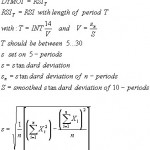Simply speaking, The Dynamic Momentum Index is an adaptive RSI. This means it adjusts itself according to the current volatility of the market. Accordingly, the period length will be shortened during volatile phases and lengthened during calmer market phases, unlike RSI. RSI usually uses 14 periods but the length of periods in DMI changes according to the conditions of the … [Read more...]
Dynamic Momentum Index : The Concept
By definition, The Dynamic momentum index is an indicator used in technical analysis that determines overbought and oversold conditions of a particular asset. This indicator is very similar to the relative strength index (RSI). The main difference between the two is that the RSI uses a fixed number of time periods (usually 14), while the dynamic momentum index uses different … [Read more...]
